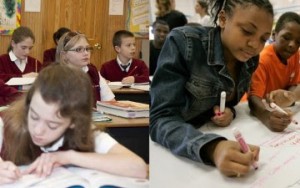
1. What led you to do this research?
I’m from the Mississippi Delta, a place with essentially a dual education system, where the legacies of slavery and Jim Crow are almost palpable, so I wanted to empirically investigate whether and how slavery was actually shaping this dual educational system.
2. What should everybody know about what you found?
Antebellum slavery still profoundly effects the contemporary Southern landscape. We examined how Southern counties’ connection to slavery in 1860, the height of the slave economy, shapes racial disparities in public school enrollment.
We found that across the South, on average, black students are about 10 percent more likely than white students to attend public schools, but that varies widely. In counties with a stronger connection to slavery, black students are increasingly more likely than white students to attend public schools. This means that antebellum slavery helped to create a dual school system where, as black students began to integrate, whites disinvested from the public school system in favor of a private school system. This exacerbates racial school segregation, creating the pattern that persists today. This relationship between slavery and the contemporary school system persists even when we accounted for a variety of other factors that may shape these racial differences.
3. What are you going to do next on this topic?
Now that we have established how slavery shapes school segregation through a dual school system in the South, we are investigating how the historical determinants of school segregation differ across the country. Specifically, we’re looking at differences in the appearance of modern school systems between states in the northeast and midwest that abolished slavery earlier (so-called “non-slave” states) and western states that never adopted the institution.
You can read the full article here:




Comments